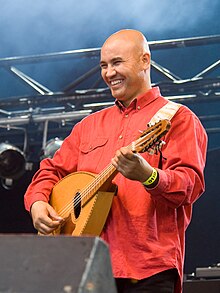|
Abderrahmane Abdelli
Abderrahmane Abdelli (born April 2, 1958) is a Berber author, composer, and singer songwriter known for mixing the traditional North African music of his homeland with modern sounds. BiographyAbdelli was born in Mechta Behalil, a hamlet in the Great Kabylie, Algeria, during the Algerian War of Independence. His family was displaced by the bombing of their village, Kennour,[1] part of the Tizi Ouzou Province, by the French airforce. After the war, Abdelli's family settled in the coastal town of Dellys. As a boy, Abdelli constructed his first guitar out of an empty oil can, a plank of wood and fishing line.[2] After learning to play the guitar, He was introduced to the mandol by Chaabi master, Chaïd Moh-Esguir.[2] Abdelli made his musical debut in Dellys, Kabylie, during the 1974 Algerian Independence festival.[3] He won several contests in Algeria for amateur singers.[4] Abdelli produced his first album in 1984, but it saw little success. Two years later, he released an album that sold 12,000 copies, but never received payment from his record company Abdelli produced a couple of albums in Algeria, but moved to Belgium in 1984. It was there "he met producer Thierry Van Roy, who was so fascinated with Abdelli's music that he spent two years exploring the roots of the Berbers' musical tradition at the University of Algiers."[4] Since 1986 he has made his home in Brussels, Belgium. Abdelli's most popular albums are New Moon[5] and Among Brothers[6] He has performed at major festivals in Europe, including WOMAD and the 0110 concert in Ghent. In addition to Europe he has toured in England, the US and Canada. InfluencesAbdelli's music reflects a heavy Algerian influence. As stated by World Music Central:
Abdelli has collaborated with musicians from Europe and South America, often incorporating instruments such as the cajón (Peru), the tormento, the quena (Chilean), and the bandura (Ukrainian). Discography
Band members
Notes
References
External links
|
||||||||||||||||||||||
Portal di Ensiklopedia Dunia
